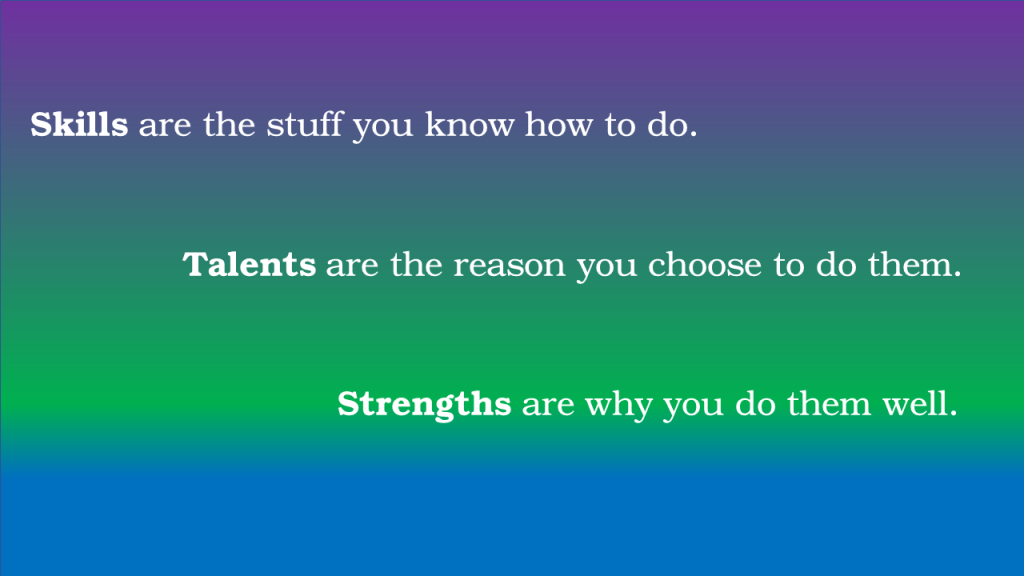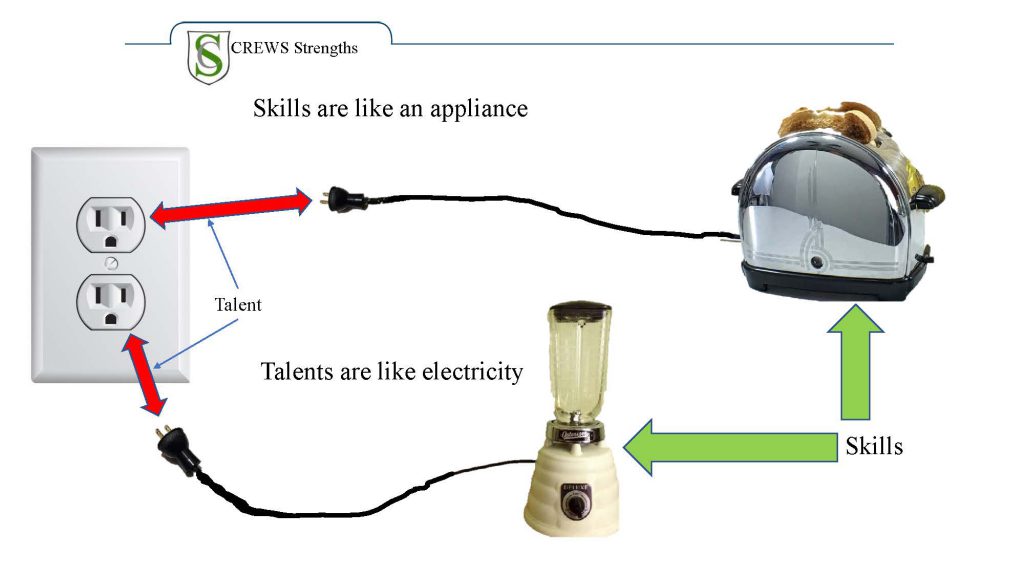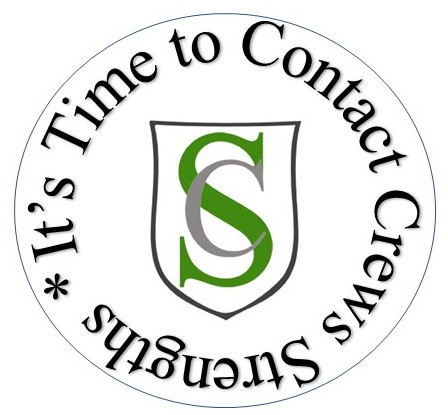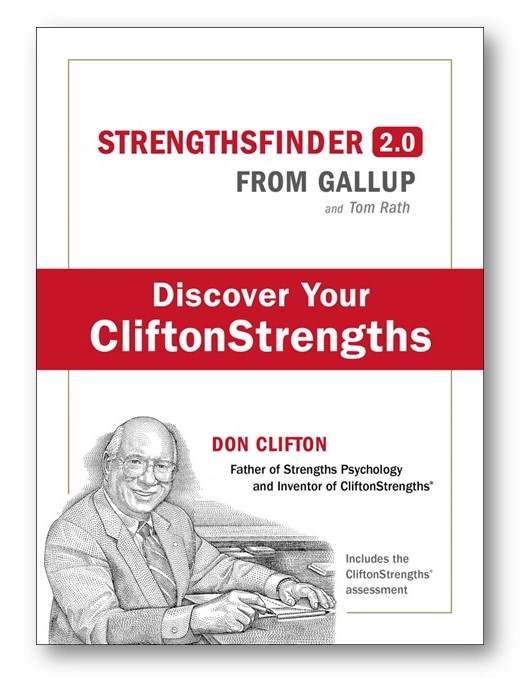Blog
It’s Time to Put Your Skills, Talents, Strengths (and even Weaknesses) to Work! (Once you figure out what they are).

Why should you be interested in taking the CliftonStrengths (StrengthsFinder) assessment?
Because the CliftonStrengths (StrengthsFinder) assessment reveals your Strengths’ profile, providing you with your top five Strengths. Actually, the assessment reveals your top five talents. That would be the top five talents out of 34 possible talents.
So why isn’t it called the CliftonTalents assessment? The assessment’s name uses the term Strengths because that is what they can become. I know it seems kind of like calling an egg, a chicken. However, the assessment is about you being the best you possible.
And you might be thinking that the assessment used to be called StrengthsFinder? Yes, it did. In fact, almost everyone besides the company that owns the assessment still tends to call it StrengthsFinder. And that company continues using the title, StrengthsFinder 2.0, for the 2007 book which remains extremely popular and is many people’s introduction to the Strengths movement.

Gallup, which publishes StrengthsFinder 2.0, owns, and maintains the assessment formerly known as the StrengthsFinder assessment. Why the name change? It honors Donald O. Clifton, PhD, the father of the assessment and Strength’s psychology. However, the older name, StrengthsFinder, continues to be the name most commonly used. Call it StrengthsFinder or CliftonStrengths, either name works. The assessment is just as awesome, no matter which moniker you choose.
So, why does the assessment, known by either Strengths’ name, reveal talents instead of Strengths? Like the chicken or egg mentioned earlier, it’s about the starting point versus the goal.
Gallup describes a talent as: “A naturally recurring pattern of thought, feeling or behavior that can be productively applied”. Think of your talents as your hows, whys, and motivation. Or they can be described as whatever it is that makes you tick. You get an inkling of talents when what you are doing or thinking or feeling, energizes you. Not necessarily doing the task, but by the method, process, or mode in which you approach the task.
How does a Strength differ from a talent? It is a mostly a matter of raw versus refined. Gallup’s description of Strength is “A trait which consistently produces a positive outcome through near-perfect performance in a specific activity”. Another way to look at it is that a Strength is a talent that you can work to develop, and that effort repeatedly leads to amazing results!
Strength = talent + effort
So, talents are like being able to play the guitar and Strengths is like being able to play the guitar really well!?!? Not exactly.
Using the concepts as they relate to Strengths, your ability to play guitar and play it well, is a skill. It’s the why you want to play guitar that reveals your talents and Strengths. The same is true if the thing you are good at is auto repair, genetic laboratory work, marathon running or doing non-Euclidian geometry.
Skills are the stuff you know how to do.
Talents are the reason you choose to do them.
Strengths are why you do them well.

Another way to look at skills versus talents is to think of your skills as being appliances. A toaster might equal auto mechanical skills, and a blender represents computer programming skills. Each of these skills is a particular thing that can be done. The talent is the electricity when you plug it into the outlet. The electricity can make numerous things happen. And when you don’t have electricity, there is unlikely to be toast or margaritas (or amazing results).
There is a similarity between skills and talents. It is the fact that you can actually work on them. Just like playing and practicing the guitar leads to better guitar playing, practicing, and committing to your talents can lead to greater success.
Talents are about your hows, whys and motivation. Skills are about doing or thinking about stuff. Talents influence skills. For instance, working with realtors, I have found all sorts of reasons why realtors want to sell houses. One realtor is successful because he has a vision of families finding a home where they can thrive. Another realtor grew up in nearly destitute circumstances. Her real estate success comes from a commitment to solve that problem. Yet others love the give and take of negotiation or the thrill they feel when they are competing to be the best salesperson in their office. In each case, their skill is selling real estate. Their talent is what makes them care about selling real estate.
Getting your best performance comes from knowing why you do the stuff you do and why you think and feel the way you do. Think of two marathon runners. Let’s say that one has the Achiever® Strength, while the other has the Competition® Strength. Each one approaches improving their results differently. The Achiever® likes to accomplish things. An Achiever® tends to like lists and are thrilled to note completed tasks. The runner with the Competition® Strength likes to win and likes the thrill of competition. Competition® usually looks for worthy opponents because success is about being tested.

So how does the Achiever® improve her marathon? Probably by setting a goal, like shaving 10 seconds off every mile. What about the high Competition®? Most likely, he sets his pace to a runner who is a little better than he is and then passes that person and then picks another and ultimately another. The Achiever® is unlikely to be motivated by the runner half a block ahead of them and the high Competition® is unlikely to consider that a goal of seconds off per mile is making a difference to them.
Both methods can lead to better marathons. Neither system is likely to be effective to someone who does not have that Strength. This is one of the reasons that most self-help books are so unhelpful. They are usually written from the talents point of view of the author, without understanding that the reader may not be wired the same way.
But what about weaknesses. Surely, you have to consider weaknesses. Yes, you do. That is what I will do in my next post.
Thank you
Thank you for continuing to read these posts. I trust that you find them valuable.
If you found this post to be of value, please like it and comment on it on LinkedIn at this location.
Helping people find meaningful, purposeful, engaging employment is my goal. If you need help with a job search, creating a resume, deciding to make a career move or figuring out how to put your Strengths to work, please reach out to me.
Previous Posts
- “It’s Time for You to Ask the Questions!” - August 8, 2024
- What “Superpowers” are Hiding in Your Toolbox?: - May 29, 2024
- It’s Time to Put Your Strengths to Work for Your Interview – Part 4 - October 16, 2023
- It’s Time to Put Your Strengths to Work for Your Interview – Part 3 - August 21, 2023
- It’s Time to Put Your Strengths to Work for Your Interview – part 2 - July 20, 2023
- It’s Time to Put Your Strengths to Work for Your Interview - June 22, 2023
- It’s Time to Put Your References to Work - February 14, 2023
- It’s Time to Work Around Your Weaknesses - November 15, 2022
- It’s Time to Put Your Skills, Talents, Strengths (and even Weaknesses) to Work! (Once you figure out what they are). - October 13, 2022
- It’s Time to Put Your Strengths to Work: Why Hire a Coach? - August 1, 2022
- It’s Time to Put Your Strengths to Work: Rejection and the Job Search - June 25, 2022
- No One Deserves to HATE Their Job! : Your Solution to the “Great Resignation” - May 23, 2022
- It’s Time to Put Your Strengths to Work: Strengths and the Reentry Career Alliance Academy - March 3, 2022
- It’s Time to Put Your Resume to Work: Part 11. An Inventory of Your Career: Resume as Assessment - February 3, 2022
- Have Yourself a Merry Little Job Search: - November 23, 2021
- It’s Time to Put Your Resume to Work: Part 10. - October 21, 2021
- It’s Time to Put Your Resume to Work: Part 9 – Avoiding the Trash - August 25, 2021
- It’s Time to Put Your Resume to Work: Post 8. How Dressed Up Does Your Resume Need to Be? - July 20, 2021
- “It’s Time to Put Your Resume to Work” : Part 7: What to Do When You Don’t Meet All the Requirements - June 24, 2021
- “It’s Time to Put Your Resume to Work”: Part 6. Avoiding the Mundane, Boring, and Useless - May 26, 2021
- “It’s Time to Put Your Resume to Work”, Part 5 – Creating a Universal Resume (When you Don’t have All the Facts) - May 5, 2021
- “It’s Time to Put Your Resume to Work” – Part 4: Finding the Words (literally) - April 7, 2021
- BONUS – “It’s Time to Put Your Resume to Work”- Part 3a : What is the Correct Length for Your Resume? - March 25, 2021
- “It’s Time to Put Your Resume to Work”- Part 3 : The a la Carte or Customizable Resume - March 16, 2021
- It’s Time to Put Your Resume to Work – part 2 - February 9, 2021
- It’s Time to Put Your Resume to Work – part 1 - January 27, 2021
- Strengths Help You Hear the Music - October 20, 2020
- StrengthsFinder & the Ancient Philosopher - September 3, 2020
- StrengthsFinder Domains: A View of Your Strengths from 50,000 Feet - July 20, 2020
- Talents are Your Edge in a Job Search - June 25, 2020
- This Is Who You Are and That’s A Good Thing - May 22, 2020
- Introvert or Extrovert: A CliftonStrengths view - May 13, 2020
- Is It Time to Put Your “Superpowers” to Work? - April 10, 2020
- Who Are You? - April 3, 2020

